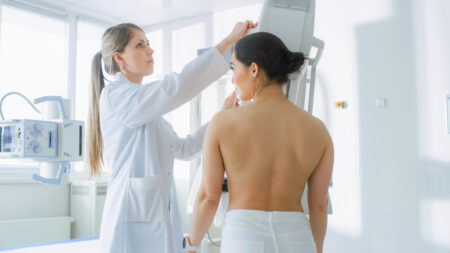
The early diagnosis of breast cancer is key in the probability of success in the treatment of this disease. The smaller the lesions or the earlier the signs suspicious for breast cancer are the more favorable the prognosis. The standard today for this screening begins with mammograms and having them done on a regular basis.
This does, however, create an issue for women who have had a breast augmentation with breast implants. The reasons for this is that their breast implants can impact the results of their mammograms.
Many women may not even be aware of this issue. Fortunately, this is no revelation or surprise for both the radiologists (doctors who read the mammograms) and the radiology techs (individuals who perform the mammograms – so be nice to them!). They are well informed that such a relationship exists as well as how to address it.
Let’s look into this a little further.
How do Breast Implants Affect Your Mammograms?
Mammograms use low dose X-rays to help detect the anatomy of your breasts. This reduced level of radiation is intentional so as to reduce this technique as being a potential risk factor in the development of breast cancer. Unfortunately, some of the low dose radiation is blocked from penetrating the breast implants resulting in the breast tissues not being seen quite as clearly and accurately as may otherwise be the case with a higher dosage. This is a tradeoff for your safety.
Which Breast Implants Interfere with Mammograms?
Both silicone and saline implants interfere with the penetration of the X-rays. On this basis only, neither has an advantage over the other.
Submuscular versus Submammary Implant Placement: Which is Better for Mammographic Interpretation?
Without a doubt, it is more difficult to visualize the breasts on mammogram with the breast implants situated in front of the muscle (known as submammary or pre-pectoral) as compared to behind the muscle (known as submammary or submuscular). Additional maneuvers have to be done during the mammogram with the implants in the submammary position in order to evaluate more of the breast. In the presence of capsular contracture, this becomes quite problematic, if not impossible.
This is one of the most important reasons to have your breast implants placed behind the muscle.
When Having Your Mammogram Done, Let Them Know that You Have Breast Implants.
Because breast implants do interfere with mammograms, it is absolutely to your benefit to inform the facility where you are having it done that you do have breast implants. You can let them know both when scheduling your appointment and the day of your study. This way, standard modifications can be made so that you can obtain a better mammogram.
Having Breast Implants, How Can the Accuracy of Your Mammograms be Improved?
Knowing that you have breast implants, the mammogram technician can take additional views and use breast displacement techniques that can maximize the quality of the study. In addition, digital mammograms can potentially provide more information with a little less radiation exposure compared to film mammography. It is more expensive, though.
What are the Alternatives for the Screening of Your Breasts?
Other options to mammograms are a digital ultrasound and an MRI. There may be significant financial and insurance issues with these alternatives, especially the MRI which can be quite costly especially when paid out of pocket.
Can Mammograms Rupture my Breast Implants?
Yes, on very rare occasions, the compression required for a mammogram can cause implant rupture. This would be far more likely to occur with implants in place 20 – 30 years or more versus more recently placed ones. For many reasons, implants are made to be durable. In fact, you can find YouTube videos of them remaining intact after being intentionally jumped on, dropped from great heights and even being run over by cars.
Now that is pretty tough!
***************************************
Hopefully, the above information has been very helpful to you regarding your breast implants and mammograms. Maybe it is more than you wanted or needed to know. Regardless, remember that it is important to obtain the appropriate evaluations of your breasts in order to screen for breast cancer. Make sure that you follow the recommendations of your primary care doctor or ob-gyn and know that you do have options.
Steven H. Turkeltaub, M.D. P.C.
Scottsdale and Phoenix, Arizona
